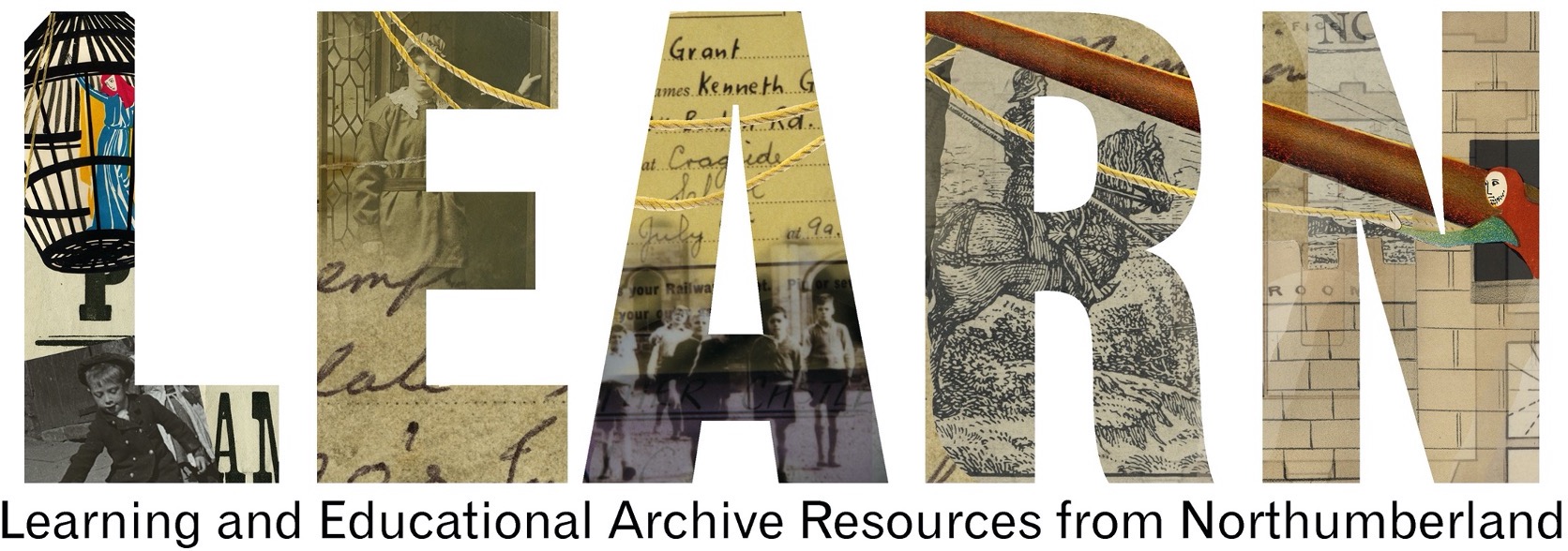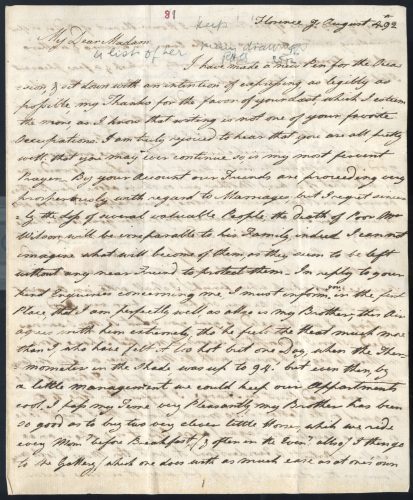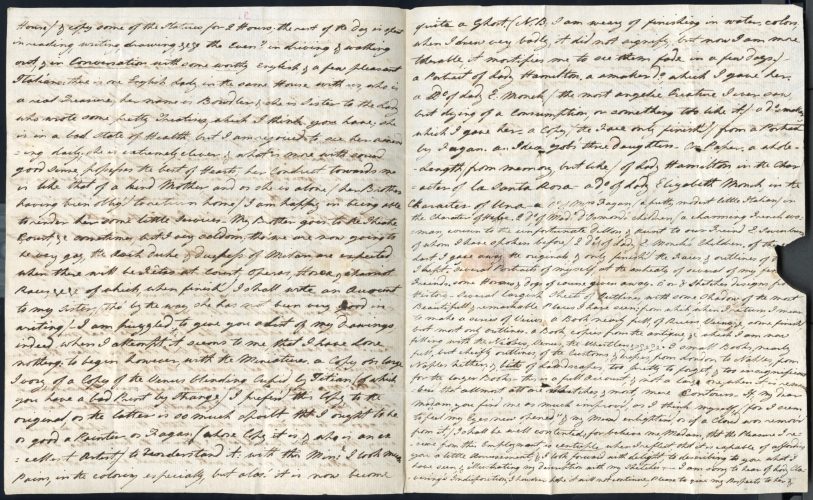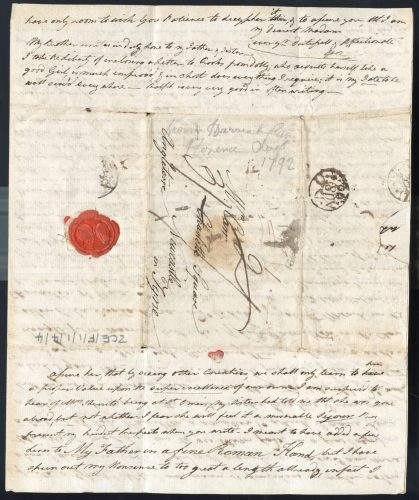Painting of Georgiana Cavendish, Duchess of Devonshire by Harriet Carr, 1792
Reference: ZCE F/4/1/3/14
Topics: Portraiture, The Grand Tour, The Duchess Of Devonshire, French Revolutionary Wars
PAINTING OF THE DUCHESS OF DEVONSHIRE
Harriet Carr brought home to England some of the paintings that she made whilst on the Grand Tour.
This painting is of Georgiana Cavendish, Duchess of Devonshire (1757-1806), wife of William, 5th Duke of Devonshire. The Cavendish family were at height of British aristocratic society and Harriet’s association with Georgiana provides evidence of the social circles in which John and Harriet Carr moved and of the regard for Harriet as an artist.
Harriet makes reference to the portrait of Georgiana in her letter to her mother of 24 December 1792 (ref: ZCE/F/1/1/4/6) – ‘I have succeeded in making a tolerable Likeness of the Duchess of Devonshire, a thing that has not often been done before, as she is Difficulty personified …’. At this time Georgiana was effectively living in exile in Europe. On 20 February 1792 she secretly gave birth, in France, to a daughter, Eliza, the illegitimate child of Charles Grey of Falloden, Northumberland. Georgiana spent much of the period 1791-1793 in Europe before returning home to her husband in London in September 1793.
ADDITIONAL RESOURCES
This letter was written by Harriet Carr from Florence, Italy, to her mother, Isabella, at her parent’s Newcastle residence in Charlotte Square on 24 December 1792.
The first paragraph of the letter is a report on the current political situation in Europe. It is this that has prevented John and Harriet returning home earlier. Harriet is keen to reassure her parents that she and her brother are not in immediate danger, ‘I assure you Florence is at this Moment, a very enviable Situation, as there is not any other part of Europe so free from Apprehension, either of Invasion or Revolution’. She goes on to report that the French military have been to Naples but have left peaceably. Their next destination is not clear but may be Mola di Gaeta, a small port on the Tyrrhenenian coast of Italy, now known as Formia, ‘from whence, they would have two easy days March to Rome’.
Harriet goes on to suggest that she expects the situation to be clearer over the next couple of days ‘as the French Minister expects to be inform’d of the Popes Answer, to the ultimate Requisition of the Convention’. In September 1792 the National Convention was established in France. It was a Parliament of the French Revolution and ran until October 1795. The convention introduced universal male suffrage – all men over the aged of twenty-five were able to vote. This contrasted with Britain where only one man in ten was able to vote at this time. The first major act of the Convention was to abolish the French monarchy and established France as a republic. This led to the trial and execution of King Louis XVI on 21 January 1793. The Pope, Pius VI, condemned the French Revolution which shifted power in France away from the Roman Catholic Church and saw the confiscation of church property and the execution of Catholic priests. In 1796 French troops invaded Italy and defeated papal troops. In 1798 French troops invade Rome and declared it a republic. Pope Pius VI was taken prisoner to France where he died on 29 August 1799.
In the second paragraph of the letter Harriet refers to her interest in art and improvements made with her drawing. Harriet had a lifelong interest in art and is thought to have received some formal training from John “Warwick” Smith (1749-1831), a watercolour landscape artist and illustrator. In the letter she refers to making copies of three Titian paintings on ivory and vellum and of creating portraits of fellow travellers, including one of Georgiana, Duchess of Devonshire. The copying of paintings involved visiting galleries or palaces to study and copy works of arts. Harriet makes specific reference to visiting the Palace Pitti in Florence. This was the home of the Medici family and held many art treasures. Harriet is keen to tell her mother that she is not over-exerting herself. Her family were concerned about her health – she suffered from a longstanding cough, thought to be tuberculosis. Harriet describes her routine, ‘I never sit down to draw untill 11 o’Clock; we allways go ou[t] at One, & stay 2 hours, & I neer touch a Pencil after Di[nner.]’.
Harriet’s letter gives a real sense of the turmoil that the French Revolution caused in Europe. She writes ‘…tho’ every post it is to be dreaded will bring us the confirmation of the Declaration of War: What will be the Consequence Heaven only knows; in the mean time, we can only pray to be preserv’d from the Confusion & misery that reigns all around us’.
ZCE F/1/1/4/6 Letter from Harriet Carr, Florence, Italy, to her mother Isabella Carr, 24th December 1792.
Florence Dec[embe]r 24 [17]92
My Dear Madam
I should have replied sooner to your kind Letter of the 13th Nov[embe]r, had not my Brother written the Post after the Receipt of it. I assure you Florence is at this Moment, a very enviable Situation, as there is not any other part of Europe so free from Apprehension, either of Invasion or Revolution; We have just receiv’d Accounts of the French having been on a Visit (of Civility it seems,) to Naples, from whence, having obtain’d everything they required, they sail’d immediately; their destination is unknown, common Report fixes it for Mola di Gaeta, from whence, they would have two easy days March to Rome: Tomorrow however, we hope to hear her Fate, as the French Minister expects to be inform’d of the Popes Answer, to the ultimate Requisition of the Convention; an Event, for which one cannot help feeling the utmost anxiety; for the French Motto towards Rome, is, “War to the Castles, Peace to the Cottage, & Protection to the Arts”, I still fear, that all would be bitter sufferers by such Guests. We have been daily tormented by Reports of disturbances in England, foundationless ones happily for us; tho’ every post it is to be dreaded will bring us the confirmation of the Declaration of War: What will be the Consequence Heaven only knows; in the mean time, we can only pray to be preserv’d from the Confusion & misery that reigns all around us.
Indeed my dearest Madam, my Father’s Goodness & your’s is unbounded towards us; I trust that God in his mercy may grant us all many Years of Life & Health, that we may have an Opportunity of proving our Gratitude. Believe me, there is no excuse to fear y feeling the North of England dull or unamusing; whilst it is in my Power to contribute towards the Happiness of my Parents & Family, I must allways feel truly blessed, and there is nothing to which I look forward with so much Pleasure, as to making you partake in some degree of satisfaction & (may I hope?) Improvement I have receiv’d & made, since I left England. Do not think that “much Italian Flattery has made me Vain”, I am thoroughly convinc’d of my own extreme defficiency, and much as I am made of here, (to use our own native Expressions) I fear I must limit the Improvement I boasted of, to one thing only, viz: my Drawing, in which, I think you will see me really improv’d, (if some Mischance does not overtake my Port-Folio before it reaches you) notwithstanding the fading of the Colors, I have been tempted to copy another Titian, in miniature, & am now beginning a third on Vellum, for, (dire to tell!) all my english stock of Ivory is exhausted; I have had a good deal of Employment in the Portrait way, which I have not regretted, as all my Models have been beauties; I have succeeded in making a tolerable Likeness of the Duchess of Devonshire, a thing that has not often been done before, as she is Difficulty personified but with all this , do not suffer my Father to think, that I apply too much; as I never sit down to draw untill 11 o’Clock; we allways go ou[t] at One, & stay 2 hours, & I neer touch a Pencil after Di[nner.] There are very few English Families here at present, no Pass[en]gers except Lord & Lady Camelford; however we have no want of Society, or Cheerfullness; on the Contrary we dance twice a week, here, or at the House of Swiss Gentleman, who has several charming Daughters;
there is allso an English Lady, she has two Daughters, the eldest a few Years my junior; she has a wonderfull Genius for Painting & if possible more liking for it than even myself, we copy together at the Palace Pitti, which is very pleasant, as she is in every respect a most superior Girl. I am truly sorry my Dear Madam, that I cannot at present comply with your kind & flattering Request with regard to my Portrait; I have no safe means of sending it, L[or]d Hervey’s Brother is indeed going to England, but by sea, & with the Squadron on this Station, so that in all Probability we ourselves, may reach England before him; however I will begin it, in hopes of being able to convey it in some way or other. You bid me not write a long Letter, but indeed to you I cannot stop my scribbling quill; Pardon me, if I exceedingly tire your Patience or your eyes. All Florence is preparing for the Gayities of the Carnival, the last, I remember was not very gay to me; nor shall I much partake of this. My best Duty & Love attend my Father & Sister (the latter has no doubt long ago rec[eive]d my Letter,) in which I sh[ou]ld be join’d by my Brother, did he know that I was writing. Believe me dear Mad[a]m ever your gratefull & affectionate H[arriet] C[arr]
Please to remember me to Crooks Robert &c &c. Dolly is grown extremely usefull; I have never employ’d a Mantua maker, milliner, or Taylor, since I came abroad.
ADDITIONAL RESOURCES
Georgiana, Duchess of Devonshire
Georgiana Duchess of Devonshire by Amanda Foreman (Harper Collins, 1998)
John ‘Warwick’ Smith
Drawings of John ‘Warwick’ Smith from the Warwick Collection by Edward Croft Murray (British Museum Quarterly, Vol.11 No.1, Oct 1936, pp. 9-11)
John (Warwick) Smith (1749-1831) by Basil S. Long (Walker’s Galleries London, 1920) Available online at: https://archive.org/details/johnwarwicksmith00longuoft/mode/2up
French Revolution, Republic, and Italian Campaign
The Ancien Regime and the Revolution by Alexis de Tocqueville (translated by Gerald Bevan, Penguin Classics, 2008)
Interpreting the French Revolution by François Furet (Cambridge University Press, 1981)
The Wars of the French Revolution: 1792-1801 by Charles J. Esdaile (Routledge (2018)
Napoleon’s 1796 Italian Campaign by Carl von Clausewitz (Translated by Nicholas Murray, University Press of Kansas, 2018)
The French Republic: History, Values, Debates edited by Edward G. Berenson, Vincent Duclert & Christophe Prochasson (Cornell University Press, 2011)





